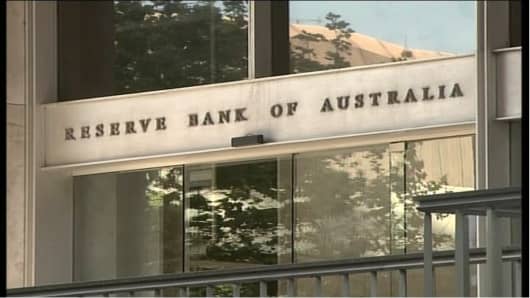The Australian dollar climbed over half a U.S. cent as the robust data added to the case for an interest rate rise from the Reserve Bank of Australia when it
meets next month.
"The domestic background is unambiguously strong and from that standpoint alone argues for a tightening," said Su Lin Ong, a senior economist at RBC Capital Markets. "However, there is such extreme uncertainty over the global outlook right now that a pause might be prudent," she added, noting speculation the Federal Reserve may announce an emergency cut in rates any day to forestall a U.S. recession.
The RBA raised rates in both August and November last year, taking them to an 11-year peak of 6.75 percent, in an attempt to cool the economy and restrain inflation.
Going by the latest data, they have had only limited success. The TD Securities-Melbourne Institute monthly inflation gauge rose 0.6 percent in December, double November's 0.3 percent increase. Annual inflation picked up to 3.7 percent, from 3.4 percent, the fastest pace since December 2006 and well above the RBA's 2 to 3 percent target band.
The result seemed to bode ill for the government's consumer price index (CPI), due on Jan. 23, though the correlation between the two series has been rather hit and miss.
The Melbourne Institute said that, based on December's numbers, it had raised its forecast for the CPI to an increase of 1.1 percent, from 0.95 percent previously. Median forecasts in a Reuters poll of analysts had been for a 0.9 percent rise.
"Not only has inflation pressure remained strong, it intensified in December," said Joshua Williamson, a senior economist at TD. "The RBA will be particularly uneasy with both headline and underlying inflation exceeding 3 percent and with the fact that there are few signs, if any, that inflation pressures are easing," he added.
The trimmed mean of the inflation gauge, a measure of underlying price pressures, rose a sizable 0.5 percent in December. The annual pace of inflation held at 3.6 percent.
Job Ads Surge
The RBA's policy board holds its next meeting on Feb. 5 and the market is divided on whether it will tighten again. The flow of domestic economic data has been uniformly strong, but the global credit squeeze has already pushed up mortgage rates here and talk of a U.S. recession has clouded the global outlook.
"Resilient domestic data and confirmation of an inflation break-out strongly advance the case for an increase in rates at the February RBA meeting, even with the financial markets pricing in the risk of a U.S. recession," argued TD's Williamson.
Monday's job advertisement series from Australia and New Zealand Banking was a case in point.
The total number of job advertisements leapt 7.1 percent in December, the biggest monthly gain since May, to an average 274,653. That was 31 percent higher than a year earlier.
The strong results should underpin expectations for another robust employment report. Official jobs figures for December are due on Thursday and the median forecast is for another healthy rise of 20,000 in net new jobs.


